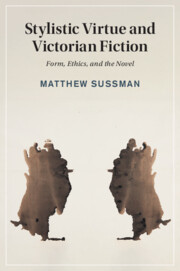Book contents
- Stylistic Virtue and Victorian Fiction
- Cambridge Studies In Nineteenth-Century Literature And Culture
- Stylistic Virtue and Victorian Fiction
- Copyright page
- Contents
- Illustrations
- Acknowledgments
- Introduction What Is Stylistic Virtue?
- Chapter 1 Stylistic Virtue and the Rise of Literary Formalism
- Chapter 2 Stylistic Virtue between Moralism and Aestheticism
- Chapter 3 Virtue Theory and the Nature of the Aesthetic
- Chapter 4 Thackeray’s Grace
- Chapter 5 Trollope’s Ease and Lucidity
- Chapter 6 Meredith’s Fervidness
- Afterword Stylistic Virtue and Literary Value
- Notes
- Bibliography
- Index
- Cambridge Studies In Nineteenth-Century Literature And Culture
Chapter 3 - Virtue Theory and the Nature of the Aesthetic
Published online by Cambridge University Press: 11 June 2021
- Stylistic Virtue and Victorian Fiction
- Cambridge Studies In Nineteenth-Century Literature And Culture
- Stylistic Virtue and Victorian Fiction
- Copyright page
- Contents
- Illustrations
- Acknowledgments
- Introduction What Is Stylistic Virtue?
- Chapter 1 Stylistic Virtue and the Rise of Literary Formalism
- Chapter 2 Stylistic Virtue between Moralism and Aestheticism
- Chapter 3 Virtue Theory and the Nature of the Aesthetic
- Chapter 4 Thackeray’s Grace
- Chapter 5 Trollope’s Ease and Lucidity
- Chapter 6 Meredith’s Fervidness
- Afterword Stylistic Virtue and Literary Value
- Notes
- Bibliography
- Index
- Cambridge Studies In Nineteenth-Century Literature And Culture
Summary
Chapter 3 further establishes the significance of Aristotelian virtue theory within the landscape of British moral philosophy, where it has been almost entirely neglected. It begins with the 1874 publication of Henry Sidgwick’s The Methods of Ethics, which was a significant literary event because it identified virtue ethics with “aesthetic” modes of reasoning. An Aristotelian conception of stylistic character subsequently flourished in the philosophical writings of J.S. Mill, John Grote, T.H. Green, and Bernard Bosanquet, all of whom rejected the dissociation of ethics from aesthetics and imagined character as an aesthetic realization of the self. In this way, philosophers in the Aristotelian tradition provided an ethical justification for aesthetic autonomy and the character-based formalism of Victorian stylistic criticism.
Keywords
- Type
- Chapter
- Information
- Stylistic Virtue and Victorian FictionForm, Ethics, and the Novel, pp. 72 - 95Publisher: Cambridge University PressPrint publication year: 2021

